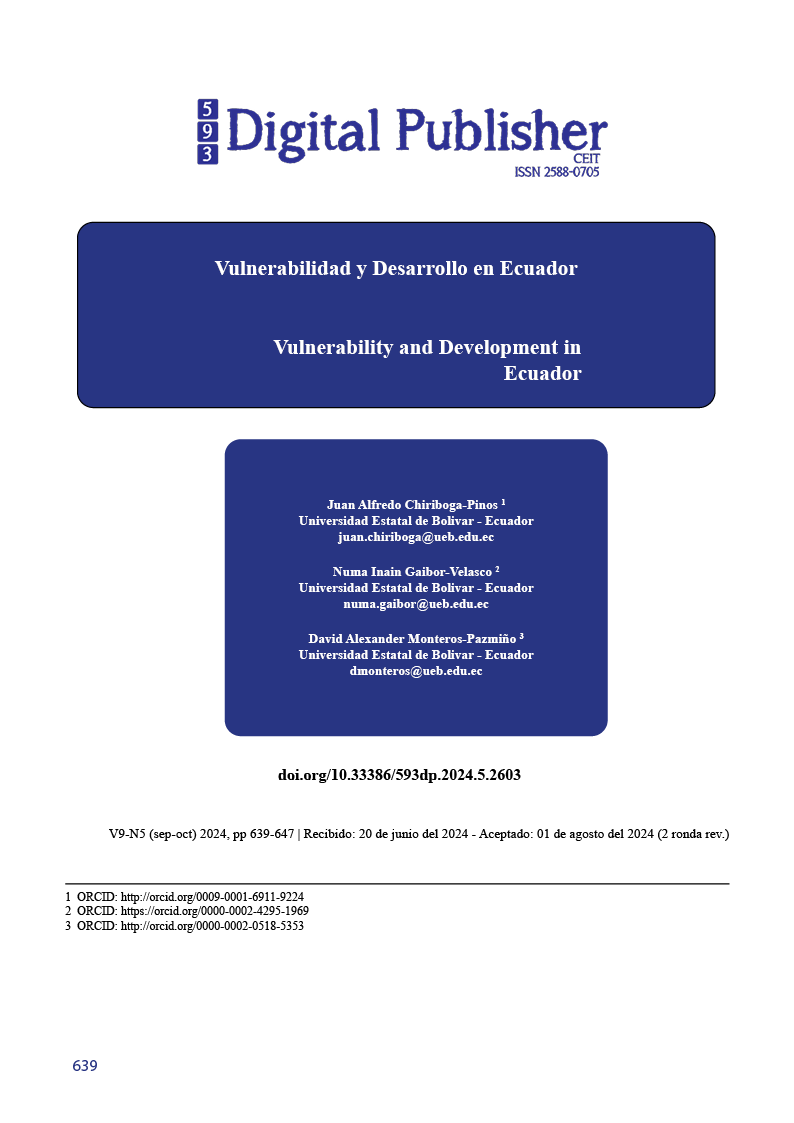Vulnerability and Development in Ecuador
Main Article Content
Abstract
Ecuador faces multiple challenges on its path to sustainable development, including poverty, inequality, natural disasters, and the effectiveness of its government policies. Approximately 25% of the population lives in poverty, a situation exacerbated in rural areas where access to basic services is limited. Labor informality and lack of economic opportunities are key factors in the persistence of poverty. Inequality in Ecuador is manifested in income, education and access to services, with a marked gap between rich and poor sectors. Educational quality is unequal between urban and rural areas, perpetuating the cycle of poverty and limiting inclusive development. The country is vulnerable to natural disasters such as earthquakes, volcanic eruptions, landslides and floods, which have devastating effects on affected communities. Managing these disasters requires a comprehensive approach that includes prevention, preparedness, response and recovery. Government policies are crucial to reduce vulnerability and promote development. Programs such as the Human Development Bonus seek to support families in extreme poverty, but it is necessary to continually evaluate and adjust them. Furthermore, it is essential to promote policies that promote inclusive economic growth, productive diversification and environmental sustainability. Investment in infrastructure, education and health is essential to create an enabling environment for sustainable development. Only through a joint commitment between the government, civil society and the private sector will Ecuador be able to overcome its vulnerabilities and move towards a more just and resilient future.
Downloads
Article Details

This work is licensed under a Creative Commons Attribution-NonCommercial-ShareAlike 4.0 International License.
1. Derechos de autor
Las obras que se publican en 593 Digital Publisher CEIT están sujetas a los siguientes términos:
1.1. 593 Digital Publisher CEIT, conserva los derechos patrimoniales (copyright) de las obras publicadas, favorece y permite la reutilización de las mismas bajo la licencia Licencia Creative Commons 4.0 de Reconocimiento-NoComercial-CompartirIgual 4.0, por lo cual se pueden copiar, usar, difundir, transmitir y exponer públicamente, siempre que:
1.1.a. Se cite la autoría y fuente original de su publicación (revista, editorial, URL).
1.1.b. No se usen para fines comerciales u onerosos.
1.1.c. Se mencione la existencia y especificaciones de esta licencia de uso.
References
- Instituto Nacional de Estadística y Censos (INEC). (2020). Encuesta Nacional de Condiciones de Vida 2020. Quito, Ecuador: INEC.
- United Nations Development Programme (UNDP). (2021). Human Development Report 2021: Vulnerability and Resilience inTimes of Crises. New York, NY: UNDP.
- World Bank. (2022). Ecuador: Country Overview. Washington, DC: World Bank. Retrieved from [https://www.worldbank.org/en/country/ecuador/overview](https://www.worldbank.org/en/country/ecuador/overview)
- Bourdieu, P. (1984). Distinction: A Social Critique of the Judgment of Taste. Cambridge, MA: Harvard University Press.
- Sen, A. (1999). Development as Freedom. Oxford: Oxford University Press.
- Giddens, A. (1991). Modernity and Self-Identity: Self and Society in the Late Modern Age. Cambridge: Polity Press.
- Ministerio del Ambiente y Agua del Ecuador. (2021). Plan Nacional de Desarrollo 2021-2025. Quito, Ecuador: Ministerio del Ambiente y Agua.
- Inter-American Development Bank (IDB). (2020). Ecuador: Building an Inclusive Future. Washington, DC: IDB.
- International Monetary Fund (IMF). (2021). Ecuador: Staff Report for the 2021 Article IV Consultation. Washington, DC: IMF.
- CEPAL. (2020). La matriz de la vulnerabilidad social: un instrumento para la identificación y medición de la vulnerabilidad social en América Latina y el Caribe. Santiago, Chile: CEPAL.
- Arévalo, J. I., & Manobanda, W. D. (2023). Identificación y priorización de los riesgos naturales y antropogénicos en el casco urbano de la parroquia san Pablo de Atenas del cantón san Miguel de la provincia de Bolívar. Período mayo–septiembre 2023 [B.S. thesis, Universidad Estatal de Bolívar. Facultad de Ciencias de la Salud y del Ser …]. https://dspace.ueb.edu.ec/handle/123456789/6528
- Barrios, Y. B., NARVÁEZ, M. A., LANDAZABAL, M. S. C., & Vargas, L. E. (2020). Clima organizacional de los procesos de participación comunitaria de una institución educativa. Caso estudio. Utopía y Praxis Latinoamericana, 25(11), 138-163.
- Cubillo, J., García, D., Benede, B., Gallego, J., & Hernán, M. (2022). Participación comunitaria: Aprendizajes de la COVID-19 para nuevas crisis. Informe SESPAS 2022. Gaceta Sanitaria, 36, S22-S25.
- Dumas, M. M., & Ramirez, L. N. (2024). Análisis de los efectos socioeconómicos del desempleo en el Ecuador: Repercusiones en la pobreza, periodo 2011-2021. https://repositorio.utmachala.edu.ec/handle/48000/22636
- Fernández, C. (2022). El desarrollo sostenible y la teoría del derecho internacional. Revista iberoamericana de estudios de desarrollo= Iberoamerican journal of development studies, 11(2), 54-77.
- Flores, C. R., García, O., Lévano, E., & Rivadeneyra, M. (2021). Percepción de la vulnerabilidad social frente al riesgo de desastres en San Juan De Lurigancho. Alternativa Financiera/Facultad de ciencias contables, económicas y financieras-USMP, 12(1). https://portalrevistas.aulavirtualusmp.pe/index.php/AF/article/view/2192
- Giovine, M. A., & Barri, J. (2024). La agencia en la sociología de Pierre Bourdieu y Anthony Giddens. Estudios sociológicos, 42. https://www.scielo.org.mx/scielo.php?pid=S2448-64422024000100115&script=sci_arttext
- Martínez, B. M., Hernández, N., Díaz, D. J., Arencibia, F., & Morejón Milera, A. (2020). Envejecimiento y caídas. Su impacto social. Revista Médica Electrónica, 42(4), 2066-2077.
- Saltos, M., Velásquez, A., Aguirre, M., Ortíz, D., Villamarín, A., Haro, R., Saltos, M., Velásquez, A., Aguirre, M., Ortíz, D., Villamarín, A., & Haro, R. (2022). Planificación Óptima de Recursos Energéticos Distribuidos para Mejorar la Resiliencia de Sistemas de Distribución de Energía Eléctrica frente a Desastres Naturales: Caso en Lahares Volcánicos. Revista Técnica energía, 18(2), 13-21. https://doi.org/10.37116/revistaenergia.v18.n2.2022.488
- Valencia, M., Le Coq, J. F., Favareto, A., Samper, M., Sáenz, F., & Sabourin, E. (2020). Políticas públicas para el desarrollo territorial rural en América Latina: Balance y perspectivas. Eutopía. Revista de Desarrollo Económico Territorial, 17. http://143.198.112.220/index.php/eutopia/article/view/4388
- Villa, L. (2020). Educación para la salud y justicia social basada en el enfoque de las capacidades: Una oportunidad para el desarrollo de la salud pública. Ciência & Saúde Coletiva, 25, 1539-1546.
- Villacís, V. M. L. (2023). Impacto del COVID-19 y desigualdad socioeconómica en la educación superior en Ecuador. Revista de Educación Superior del Sur Global-RESUR, 15, e2023n15a11-e2023n15a11.




